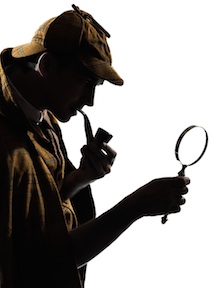By Samantha Yates
At one point, there was a widely held belief that stories about detectives did not exist in American books, magazines, or any kind of writing between Edgar Allan Poe (1849) and Sherlock Holmes (1891)—an interesting gap, given that whole genres rarely pause for approximately thirty years only to reappear and continue as if there had been no hiatus. Mary Bendel-Simso, secretary and treasurer of the Phi Beta Kappa chapter at McDaniel College, and fellow English Professor LeRoy Panek found that pause to be difficult to believe, and so set about their own investigation.
Their intuition paid off as they uncovered thousands of detective fiction stories hidden in newspapers across the country. Panek has since retired from McDaniel but Bendel-Simso continues to work tirelessly to document these lost pieces of the genre, working with both professors and students to ensure that these stories will never again be forgotten.
The project can be intense, but the reward is great; Mable Buchanan, one of the students on the research sleuthing team, loves “seeing the trends between different stories. It’s a fun topic that I already enjoyed, and I really love looking at it academically.” Finding the birth of an entire genre is an incredible contribution to make to any field. In Bendel-Simso’s own words, “It’s finding a kernel of something and then tracing it back to its roots. I think that really embodies the liberal arts and what it stands for.”
The archival research focuses on American detective fiction before 1890. Bendel-Simso and her researchers locate these stories, categorize them based on the storyline, and upload them to The Westminster Detective Library, a database where the stories are organized and available to those wishing to read them.
What makes this research in detective fiction so important is that she and her team of detectives are uncovering an entire segment of a genre that was thought to not exist. While information is available, it is scattered throughout so many nooks and crannies of the nation that it was unlikely to have been linked together as a genre. Without this information, the world of literature would be missing a large chunk of knowledge, but given that literature is tied to so many other areas of study, it would inevitably affect those other areas as well.
This information leads to a myriad of questions: Was there something going on during this time in history to make these stories particularly appealing? Literature generally reflects a time period, but it simultaneously helps to shape it—is there something that these stories can tell us that we do not already know about this era? Are they a reaction against an event or phenomena of some kind? What do these stories reveal about the culture of the time and the individual psyches of those who wrote and read stories about solving horrendous crimes? History, sociology, psychology, and countless other disciplines benefit from this recently uncovered body of fiction being brought to light.
Many individuals tend to hear the word “research” and think immediately of science, overlooking the many other forms of research that exist in academia. Bendel-Simso and her collaborators’ work serves as an excellent reminder that knowledge within each discipline is ever expanding. It is also vital to other areas of study, as disciplines overlap and affect each other. The Westminster Detective Library project is truly a testament to the ability of research to integrate multiple disciplines in a way that challenges traditional perceptions of the world.
Samantha Yates is a junior at McDaniel College majoring in English and minoring in economics. McDaniel College is home to the Delta of Maryland Chapter of Phi Beta Kappa.




